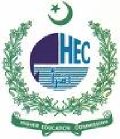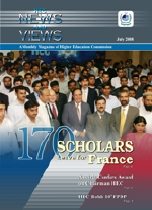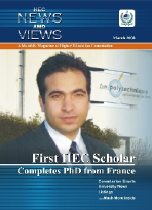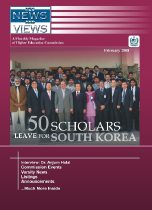Dr. Athar Osama
 Over the last several years of the current government, the Higher Education Commission (HEC) has funded thousands of scholarships and fellowships for Pakistanis to do PhD and Post-Doctoral work both at home and abroad. One of the most important of these programs has been the Foreign PhD Fellowships Scheme that funds as many as 1000 PhD fellowships per year for Pakistani students to go to countries around the world – mostly in Eastern Europe and South East Asia – to do their doctoral studies and return back after a specified duration of time to serve in Pakistani institutions.
Over the last several years of the current government, the Higher Education Commission (HEC) has funded thousands of scholarships and fellowships for Pakistanis to do PhD and Post-Doctoral work both at home and abroad. One of the most important of these programs has been the Foreign PhD Fellowships Scheme that funds as many as 1000 PhD fellowships per year for Pakistani students to go to countries around the world – mostly in Eastern Europe and South East Asia – to do their doctoral studies and return back after a specified duration of time to serve in Pakistani institutions.
Now that the first cohorts of these HEC scholars are completing their studies, the question arises: Will they return to Pakistan? And if they do, will they stay?
The terms of the program, I am told, are designed in a manner so as to dissuade these students from staying abroad after finishing their studies. This is done through a number mechanisms, including, provisions that discourage foreign employers and universities from hiring these students, and sending them to countries that are deemed not-so-hospitable to immigrant workers because of language barriers or immigration restrictions. Other initiatives to attract and absorb this talent back home include the ambitious plan of making several “world class” universities with international collaboration in Pakistan. Much has been said, and will continue to be said, about the latter and its fate continues to be in question.
While one would hope that these mechanisms put in place by HEC have been carefully thought out not only from the perspective of the country but also from that of the scholars, the other side of this coin, namely, the reception and environment these students receive when they actually return back to Pakistan has received much less attention but is equally, if not more, important for it is not enough to make these people return to Pakistan but rather policies must be in place to properly utilize and retain them.
At Pakistan Research Support Network (or Research-Network) we carried out a brief survey of the perception of Pakistani researchers and research students about the country’s research and academic environment and their motivations to work abroad or in their home country. The survey was anonymous thus allowing respondents to freely express their views and thoughts on the subject.
The survey findings represent an ample amount of both good and not-so-good news for Pakistan and its research environment. It also highlights interesting tendencies and motivations among its respondents some which may have been anticipated, but never formally documented before. These may be divided into four categories.
First, with regards to the quality of research environment in Pakistan, scholars identified a number of deficiencies including lack of quality leadership at the university, institution, and department level (92% of respondents), shortage of quality manpower (73%), and lack of quality and professional managed institutions (69%). Clearly, while an overwhelming proportion of scholars thought that Pakistan’s research and academic environment was inadequate to utilize their talents, more than 85% actually believed that Pakistan’s research and academic environment was lacking but improving over time.
Second, we asked the scholars about the intentions and motivations for returning home and/or working abroad. We believe that these individuals are very motivated and are quite realistic in terms of their expectations of what the country will have to offer to them but perhaps a little unrealistic in their perception of whether they will be able to overcome the challenges likely to be put in their way. For example, while just over 15% thought that when they return to Pakistan they will have all the necessary ingredients to allow them to carry out their research, as many as 79% said that “while they will face several challenges, but they will overcome these”. About 32% expressed serious doubts about the research and academic environment in Pakistan and noted that their decision to return will depend on whether they are able to address those concerns.
Of those surveyed, as many as 26% said that they will return back to the country because they have a “bond” with HEC or their employer to fulfill, another 34% said that while they do not have a bond with HEC or their employer, they will return back to Pakistan, nonetheless, and around 8% said that while they have a bond with HEC or their employer they are “rethinking” if they need to get out of it.
These data provide some very interesting–and heartening–results as well as opportunities for HEC or other competent agencies to devise policies to help these individuals make an informed decision. There is a vast majority of people who are willing to take on the challenge of returning back to Pakistan with a PhD in the hope that they will overcome the challenges involved. This population–young, idealistic, enterprising but also dedicated and passionate about their work–is especially vulnerable and HEC will do itself and the nation some good service to take extra care in transitioning them back into mainstream research in Pakistan.
Third, we asked the scholars about factors that demotivates them and that ultimately hamper their research productivity as a result. Several factors stood out. Freedom to work and micro-management by higher-ups (88% of scholars), access to equipment, knowledge, and data bases (75%), enough time to do research (72%), financial security (56%), and professional incentives (55%) are important consideration. The least important of all those asked–but still quite important–was financial incentives (chosen by 47%) of the scholars.
Again, evident from these responses is level of commitment and the degree of professional maturity of these scholars as are potential lessons for HEC bosses to understand and fully absorb for these are not the kind of qualities often associated with the tribal culture of Pakistani institutions where loyalty and conformance rather than freedom of expression, curiosity, and willingness to challenge intellectual authority are synomous with career progression.
Finally, there is ample room for both good news and source of concern for HEC. First of all, as many as 85% of the respondents thought that while Pakistani research and academic environment provided some challenges, it is also improving thus providing a reason for HEC to celebrate. A fairly substantial proportion of individuals are planning to return to the country which is yet another reason for HEC to be happy about. How HEC plays its cards in the coming years is likely to decide what percentage of these “likely return-ers” does it manage to convert into actual “return-ers”.
One issue of potential concern, however, is the notion or perception that HEC pays more attention to quantity rather than quality (shared by 70% of the scholars) is something that needs to be looked into and corrected for it is an often cited criticism of HEC’s policies. On the whole as well, I believe there is need for HEC to better explain its policies and programs for returning these individuals back, put it out in black and white so that people can make their future plans based on an explicit set of transparent policies rather than statements and comments that frequently appear in media.
There is also a need for a more transparent and open policy-making process at HEC that would help alleviate some of the questions and concerns these individuals may have about their future in Pakistan. Finally, HEC must develop a program to systematically evaluate the effect of its policies as well as communication strategy through independent evaluators to be able to better understand its own target market–researchers and academics inside and outside Pakistan–but also fine tune its own policies and programs. I think that if HEC could take a leaf from the findings of this survey and devise policies to help bridge some of the gaps identified above, it will finding a receptive and willing audience of young, educated, ambitious, and patriotic Pakistani researchers and scientists willing to return back and serve their homeland.
Dr. Athar Osama holds a PhD in Science and Innovation Policy and is the Founder of Pakistan Research Support Network and Muslim-Science.com






















































It doesnt matter if they return or not.
If they do return, they will add value to our local system directly, if they do not return and choose to work abroad, they will atleast add value indirectly (sending money home, improving pakistani repu, supporting other pakistanies, giving good advise to follow pakistanies and if have kids they will be more educated adn well mannered compared to generation in pakistan).
Dr. Osman,
You have highlighted a very important point about the HEC’s plans – the post-education opportunities for these talented individuals will partially determine the success or failure of this program.
In some countries, such as Singapore where talent is valued, individuals who attend university overseas on scholarships (several hundred are funded every year to the world’s best universities) are required to serve an insitution for a stipulated period of time upon completion of their education. These individuals are often also given more responsibility (which means more money also) and “fast-tracked” through the system. Many serve out their bonds periods, which range from four to eight years, and then are snapped up by private sector companies – or even better, set up their own companies or research labs. Those who stay within the government, for example, attain positions of high responsibility very quickly.
At the end of the day, these individuals, funded by the small number of tax payers in the country, will contribute. Whether they do it within or outside of the government or academia, or in the private sector, or even within or outside the country is really a moot point.
For the sake of transparency, would you kindly share the details of the survey (sample, size, questions ect), if it has not already been done elsewhere.
@Ahmad R. Shahid,
again, I disagree with you that high-tech research makes sense for the U.S. only because there is demand for “high-end products.” The majority of research funding in the U.S. goes to the NIH, the National Institutes of Health; are you saying that Pakistan doesn’t have the need for such research programs?
Also, having our own crop of researchers does not mean that they have to work on exactly the same problems that researchers in the West are working on. They can work on our unique, third-world problems in health, and even infrastructure. Sure, one doesn’t need to have a Ph.D. to be able to build dams, bridges, and roads…but you cannot expect someone with just a bachelors degree and not much experience to come up with novel and elegant solutions. A lot of people have the misconception that the Ph.D. is simply a step up from the masters; in fact, it has a completely different purpose which is to train people to come up with new ideas independently, rather than be able to follow instructions given by others.
Please tell me, why are we seeking Chinese help to build roads and dams? Why aren’t Pakistani scientists and engineers supervising the construction in Gwadar? Why did we have to wait for “foreign experts” to solve the big telecom-link problem we had some time back? Why are patients in our country having to go to India and other countries for critical treatments that Pakistan has the capacity to provide? Most of all, what’s the reason we have not been able to come up with an IIT-like program; remember that India’s poor are much worse off than Pakistan’s poor.
@Ahmad R. Shahid
I would also add to Eidee Man’s comment that you’re basing y0ur argument of possibly-depressed wages for engineers (brought about by a supply glut) on the idea that demand for such services is not changing much. Fair enough. But that should not be the case. We, for instance, are in dire need of more and better infrastructure in Pakistan. If there is investment in these and related sectors and projects, there isn’t sufficient reason for engineer’s wages to drop. Of course, this suggests the need for a variegated policy that emphasizes education as well as other sectors that contribute to a higher quality life.
America, with such an advanced economy, and such a high per capita income does really need research like all the advanced economies of OECD. But a poor country like Pakistan doesn’t need it. Surely research papers being published in China and India are increasing, probably so are in Pakistan. But it doesn’t mean that it is the reason behind 8-10% growth rates of their economies. By the way how much is the Google and Yahoo as %age of the US economy? How much they really contribute to the US economy and employment? I wonder how many really. If you have any data please do let me know.
As for Standford, and your contention that where would the USA be without it, probably at the same level. If the US economy is really that advanced, which it really is, and there is demand for the high-end products (which actually require research), which there really is, and even if you take Stanford out of the USA, another Stanford would emerge there in no time, becuase their would be great demand for what Stanford does and in its presence some other university would come up.
My point is that at this level of development we don’t have any demand for the high-end products and hence no demand for the people who would do research to produce such products. Hence the wastage of money in producing PhDs, which could have been used for better end.